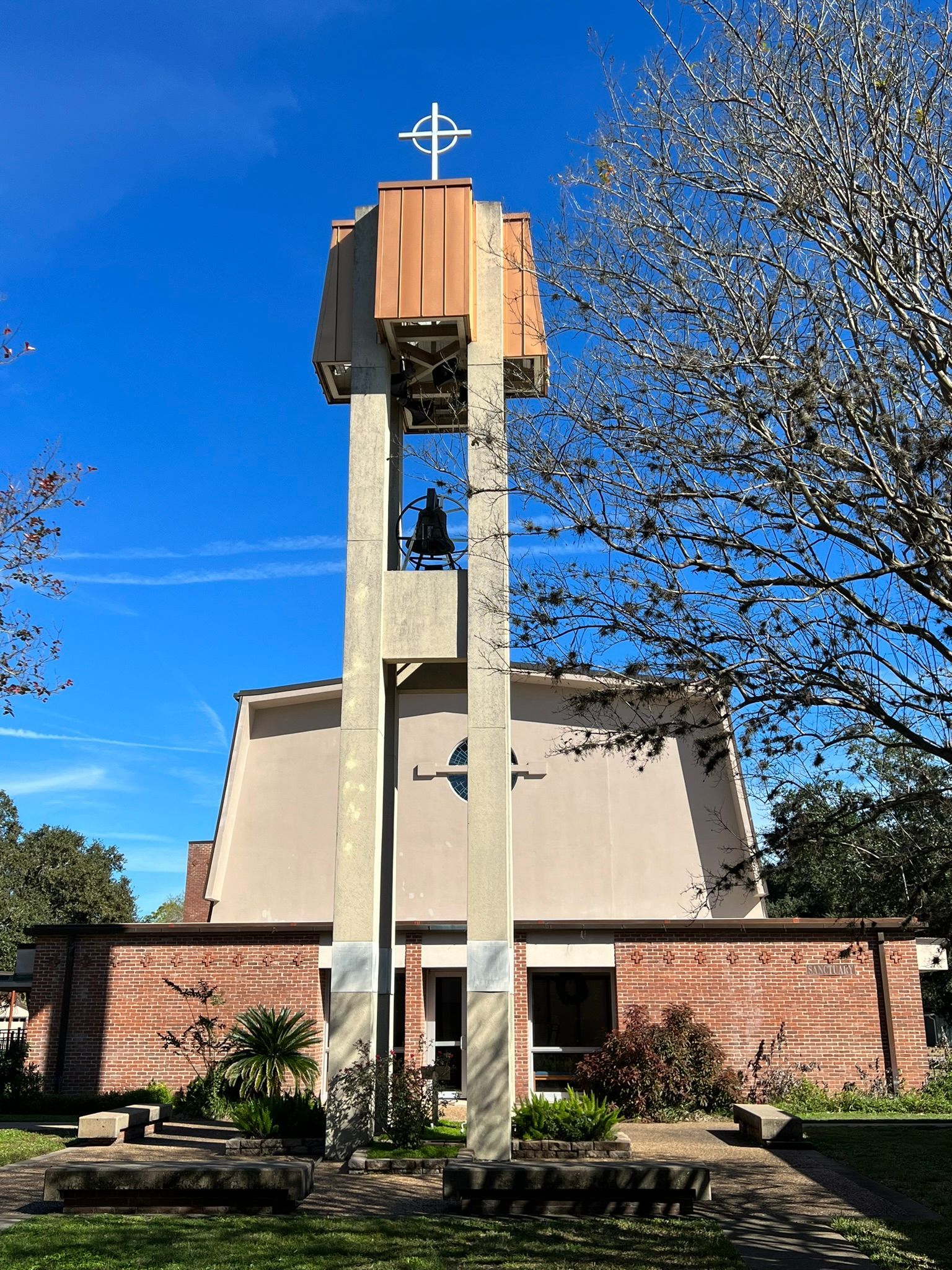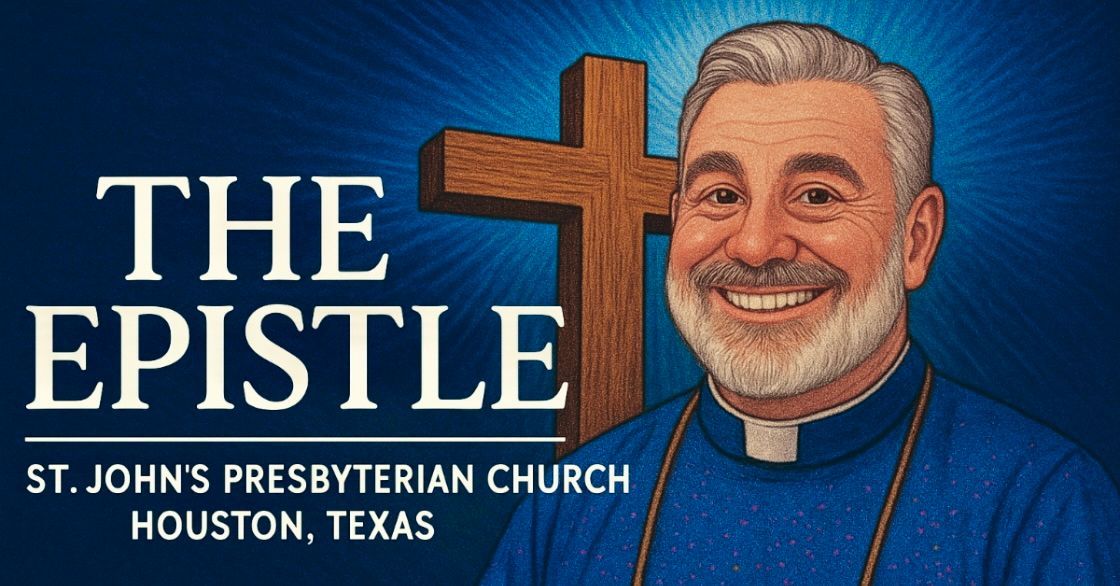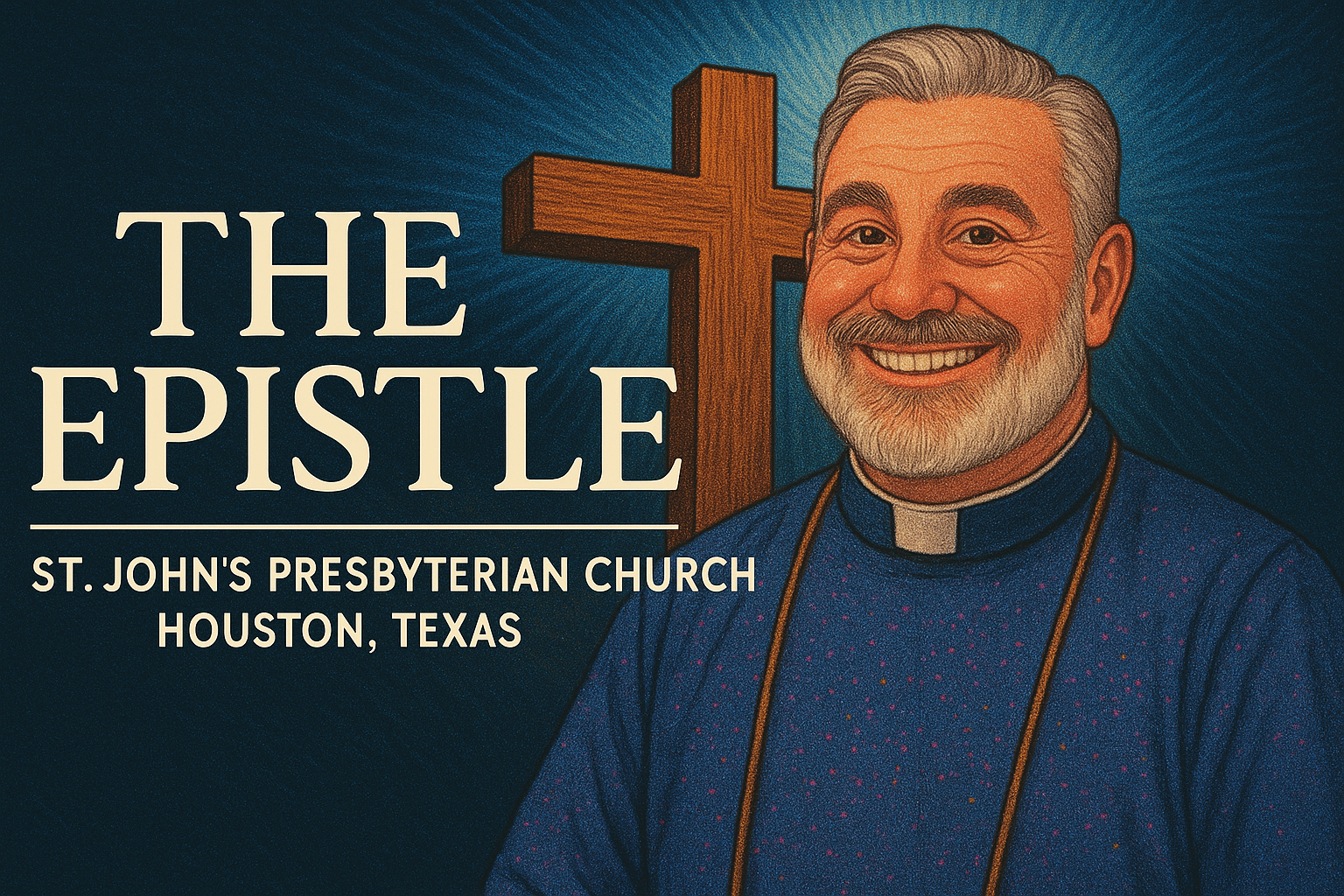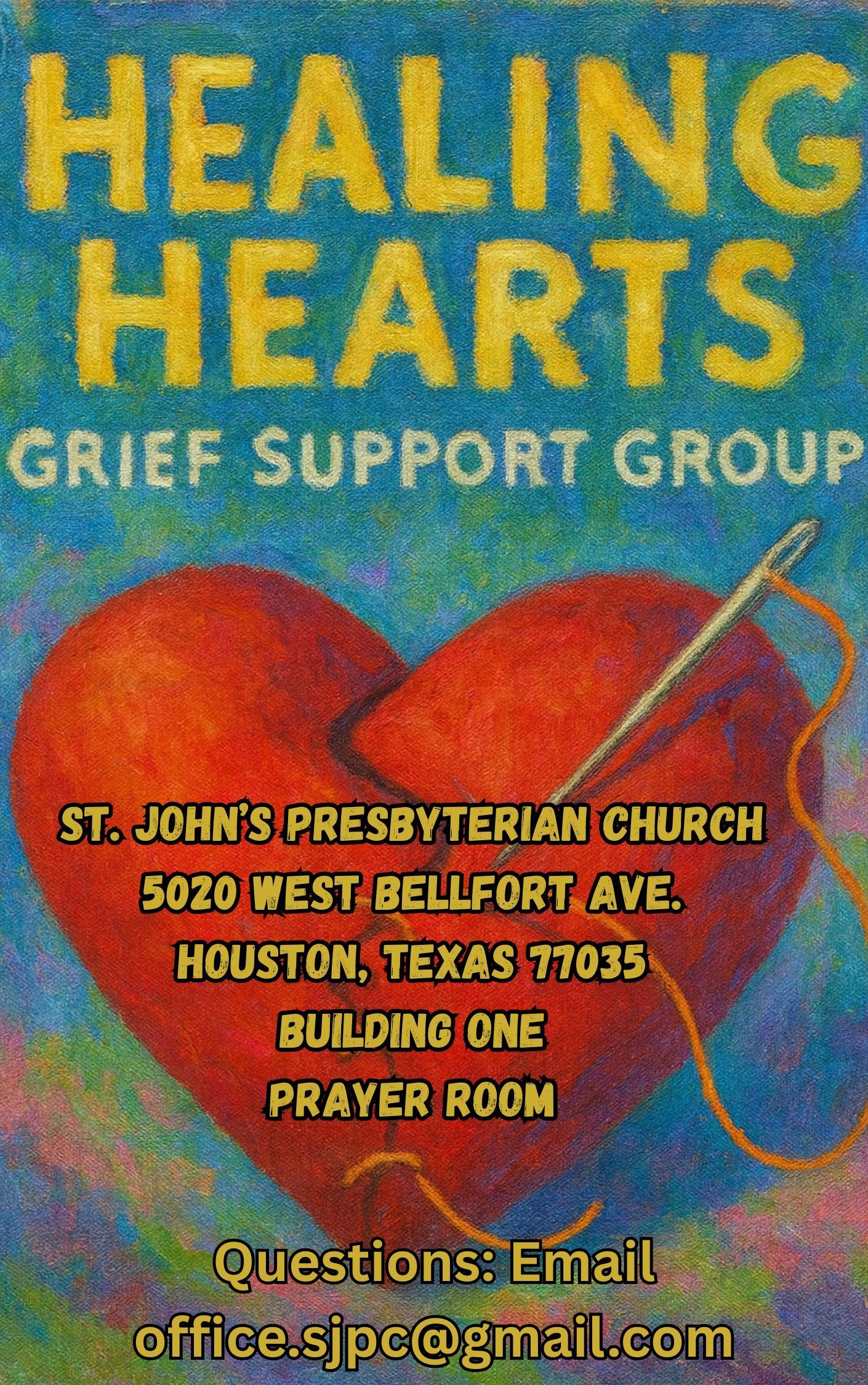By Jon Burnham
•
December 27, 2025
Invitation to Worship December 28, 2025 A Message from Pastor Jon Dear St. John’s Family, I hope this finds you well and filled with the enduring joy of the Christmas season. While I am away on vacation this week, I want to personally invite you to join us for worship on this First Sunday of Christmas, December 28th, at 11:00 a.m. in the Sanctuary and on Facebook. I am so grateful to have the wonderful Rev. Linda Herron leading our worship and bringing the message this Sunday. Please give her your warmest welcome! Rev. Herron will be preaching a sermon titled “Now the Women’s Side of the Story,” drawing from the powerful scriptures of 1 Samuel 1:1-3, 9-20, 24-28 and Luke 1:46-55 . This is a beautiful service where we continue to celebrate the wonder of Christ’s birth through the Christmas story, song, and prayer. We will be singing beloved hymns like “Angels, from the Realms of Glory,” “Infant Holy, Infant Lowly,” and “Go, Tell It on the Mountain.” It's a perfect time to come together as a community and reflect on the deep meaning of God With Us. I look forward to being back with you all soon, and I pray for a blessed and meaningful worship experience for everyone this Sunday. Peace, Pastor Jon St. John's Presbyterian Church 5020 West Bellfort Avenue Houston, TX 77035 (713) 723-6262 P.S. The service will be live-streamed on our church website and on our St. John's Facebook page . St. John's Presbyterian Bulletin Worship Bulletin December 28, 2024, First Sunday of Christmas Gathering Prelude, Alina Klimaszewska, organ *Call To Worship, Rev. Linda Herron Pastor: Angels proclaim Christ’s birth. People: Let us come and worship the newborn king. Pastor: Shepherds heard the angels, and came to worship. People: And they saw the holy baby. Pastor: All creation joins in singing. People: Praise God the Father, Spirit and Son. Amen. Opening Prayer *Hymn 143 Angels, from the Realms of Glory 1 Angels, from the realms of glory, wing your flight o’er all the earth; you, who sang creation’s story, now proclaim Messiah’s birth: Refrain: come and worship, come and worship, worship Christ, the newborn king! 2 Shepherds, in the fields abiding, watching o’er your flocks by night, God with us is now residing; yonder shines the infant light: (Refrain) 3 Sages, leave your contemplations; brighter visions beam afar; seek the great desire of nations; you have seen his natal star: (Refrain) 4 All creation, join in praising God the Father, Spirit, Son, evermore your voices raising to the eternal Three in One: (Refrain) Prayer of Confession, Liturgist Lynne Parsons Austin O Lord, you know that now our Christmas celebrations are complete, the presents are unwrapped, and we begin to count the financial the cost of our giving. But you also know that we must admit the cost of our failings, and the the failings of our society. We shower our loved ones with excess, but neglect the poor, forgotten, oppressed and lowly. Forgive us, Lord, and bless those who do not forget, and make us among their number, who work to meet the needs of others. We ask this in your holy name. Amen. (Silent Confession) Assurance of Pardon *Glory Be to the Father, Hymn 581 Glory be to the Father, and to the Son, and to the Holy Ghost; as it was in the beginning, is now, and ever shall be, world without end. Amen, amen. *Passing the Peace The Word Prayer for Illumination First Scripture Reading, 1 Samuel 1:1-3, 9-20, 24-28. There was a certain man of Ramathaim, a Zuphite from the hill country of Ephraim, whose name was Elkanah son of Jeroham son of Elihu son of Tohu son of Zuph, an Ephraimite. He had two wives; the name of one was Hannah, and the name of the other Peninnah. Peninnah had children, but Hannah had no children. After they had eaten and drunk at Shiloh, Hannah rose and presented herself before the Lord. Now Eli the priest was sitting on the seat beside the doorpost of the temple of the Lord. She was deeply distressed and prayed to the Lord and wept bitterly. She made this vow: “O Lord of hosts, if only you will look on the misery of your servant and remember me and not forget your servant but will give to your servant a male child, then I will set him before you as a nazirite until the day of his death. He shall drink neither wine nor intoxicants, and no razor shall touch his head.” As she continued praying before the Lord, Eli observed her mouth. Hannah was praying silently; only her lips moved, but her voice was not heard; therefore Eli thought she was drunk. So Eli said to her, “How long will you make a drunken spectacle of yourself? Put away your wine.” But Hannah answered, “No, my lord, I am a woman deeply troubled; I have drunk neither wine nor strong drink, but I have been pouring out my soul before the Lord. Do not regard your servant as a worthless woman, for I have been speaking out of my great anxiety and vexation all this time.” Then Eli answered, “Go in peace; the God of Israel grant the petition you have made to him.” And she said, “Let your servant find favor in your sight.” Then the woman went her way and ate and drank with her husband, and her countenance was sad no longer. In due time Hannah conceived and bore a son. She named him Samuel, for she said, “I have asked him of the Lord.” When she had weaned him, she took him up with her, along with a three-year-old bull, an ephah of flour, and a skin of wine. She brought him to the house of the Lord at Shiloh, and the child was young. Then they slaughtered the bull and brought the child to Eli. And she said, “Oh, my lord! As you live, my lord, I am the woman who was standing here in your presence praying to the Lord. For this child I prayed, and the Lord has granted me the petition that I made to him. Therefore I have lent him to the Lord; as long as he lives, he is given to the Lord.” And they worshiped the Lord there. Special Music Sermon Scripture, Luke 1:46-55 And Mary said, “My soul magnifies the Lord, and my spirit rejoices in God my Savior, for he has looked with favor on the lowly state of his servant. Surely from now on all generations will call me blessed, for the Mighty One has done great things for me, and holy is his name; indeed, his mercy is for those who fear him from generation to generation. He has shown strength with his arm; he has scattered the proud in the imagination of their hearts. He has brought down the powerful from their thrones and lifted up the lowly; he has filled the hungry with good things and sent the rich away empty. He has come to the aid of his child Israel, in remembrance of his mercy, according to the promise he made to our ancestors, to Abraham and to his descendants forever.” The Word of the Lord for us today. Thanks be to God. Sermon, “Now the Women’s Side of the Story” Rev. Linda Herron *Hymn 128 Infant Holy, Infant Lowly 1 Infant holy, infant lowly, for his bed a cattle stall; oxen lowing, little knowing Christ the babe is Lord of all. Swift are winging angels singing, noels ringing, tidings bringing: Christ the babe is Lord of all! Christ the babe is Lord of all! 2 Flocks were sleeping; shepherds keeping vigil till the morning new saw the glory, heard the story, tidings of the gospel true. Thus rejoicing, free from sorrow, praises voicing greet the morrow: Christ the babe was born for you! Christ the babe was born for you! The Apostles Creed I believe in God the Father Almighty, Maker of heaven and earth, And in Jesus Christ, his only Son our Lord, who was conceived by the Holy Ghost, born of the Virgin Mary, suffered under Pontius Pilate, was crucified, dead, and buried; he descended into hell; the third day he rose again from the dead; he ascended into heaven, and sitteth on the right hand of God the Father Almighty; from thence he shall come to judge the quick and the dead. I believe in the Holy Ghost; the holy catholic Church; the communion of saints; the forgiveness of sins; the resurrection of the body, and the life everlasting. Amen. Prayers of the People Lord’s Prayer Our Father, who art in heaven, hallowed be thy name, thy kingdom come, thy will be done on earth as it is in heaven. Give us this day our daily bread; and forgive us our debts, as we forgive our debtors; and lead us not into temptation but deliver us from evil. For thine is the kingdom, and the power, and the glory forever. Amen. Welcome and Announcements Offering *Doxology, Hymn 609 Praise God, from whom all blessings flow. Praise God, all creatures high and low. Alleluia, alleluia! Praise God, in Jesus fully known: Creator, Word, and Spirit one. Alleluia, alleluia! Alleluia, alleluia, alleluia! *Prayer after the Offering Sending *Hymn 136 Go, Tell It on the Mountain, 1 and 3 Refrain: Go, tell it on the mountain, over the hills and everywhere; go, tell it on the mountain that Jesus Christ is born! 1 While shepherds kept their watching o’er silent flocks by night, behold, throughout the heavens there shone a holy light. (Refrain) 2 The shepherds feared and trembled when lo! above the earth rang out the angel chorus that hailed our Savior’s birth. (Refrain) 3 Down in a lowly manger the humble Christ was born, and God sent us salvation that blessed Christmas morn. (Refrain) *Blessing and Postlude St. John's Presbyterian Bulletin December 28, 2024, First Sunday of Christmas Gathering Prelude, Alina Klimaszewska, organ *Call To Worship, Rev. Linda Herron Pastor: Angels proclaim Christ’s birth. People: Let us come and worship the newborn king. Pastor: Shepherds heard the angels, and came to worship. People: And they saw the holy baby. Pastor: All creation joins in singing. People: Praise God the Father, Spirit and Son. Amen. Opening Prayer *Hymn 143 Angels, from the Realms of Glory 1 Angels, from the realms of glory, wing your flight o’er all the earth; you, who sang creation’s story, now proclaim Messiah’s birth: Refrain: come and worship, come and worship, worship Christ, the newborn king! 2 Shepherds, in the fields abiding, watching o’er your flocks by night, God with us is now residing; yonder shines the infant light: (Refrain) 3 Sages, leave your contemplations; brighter visions beam afar; seek the great desire of nations; you have seen his natal star: (Refrain) 4 All creation, join in praising God the Father, Spirit, Son, evermore your voices raising to the eternal Three in One: (Refrain) Prayer of Confession, Liturgist Lynne Parsons Austin O Lord, you know that now our Christmas celebrations are complete, the presents are unwrapped, and we begin to count the financial the cost of our giving. But you also know that we must admit the cost of our failings, and the the failings of our society. We shower our loved ones with excess, but neglect the poor, forgotten, oppressed and lowly. Forgive us, Lord, and bless those who do not forget, and make us among their number, who work to meet the needs of others. We ask this in your holy name. Amen. (Silent Confession) Assurance of Pardon *Glory Be to the Father, Hymn 581 Glory be to the Father, and to the Son, and to the Holy Ghost; as it was in the beginning, is now, and ever shall be, world without end. Amen, amen. *Passing the Peace The Word Prayer for Illumination First Scripture Reading, 1 Samuel 1:1-3, 9-20, 24-28. There was a certain man of Ramathaim, a Zuphite from the hill country of Ephraim, whose name was Elkanah son of Jeroham son of Elihu son of Tohu son of Zuph, an Ephraimite. He had two wives; the name of one was Hannah, and the name of the other Peninnah. Peninnah had children, but Hannah had no children. After they had eaten and drunk at Shiloh, Hannah rose and presented herself before the Lord. Now Eli the priest was sitting on the seat beside the doorpost of the temple of the Lord. She was deeply distressed and prayed to the Lord and wept bitterly. She made this vow: “O Lord of hosts, if only you will look on the misery of your servant and remember me and not forget your servant but will give to your servant a male child, then I will set him before you as a nazirite until the day of his death. He shall drink neither wine nor intoxicants, and no razor shall touch his head.” As she continued praying before the Lord, Eli observed her mouth. Hannah was praying silently; only her lips moved, but her voice was not heard; therefore Eli thought she was drunk. So Eli said to her, “How long will you make a drunken spectacle of yourself? Put away your wine.” But Hannah answered, “No, my lord, I am a woman deeply troubled; I have drunk neither wine nor strong drink, but I have been pouring out my soul before the Lord. Do not regard your servant as a worthless woman, for I have been speaking out of my great anxiety and vexation all this time.” Then Eli answered, “Go in peace; the God of Israel grant the petition you have made to him.” And she said, “Let your servant find favor in your sight.” Then the woman went her way and ate and drank with her husband, and her countenance was sad no longer. In due time Hannah conceived and bore a son. She named him Samuel, for she said, “I have asked him of the Lord.” When she had weaned him, she took him up with her, along with a three-year-old bull, an ephah of flour, and a skin of wine. She brought him to the house of the Lord at Shiloh, and the child was young. Then they slaughtered the bull and brought the child to Eli. And she said, “Oh, my lord! As you live, my lord, I am the woman who was standing here in your presence praying to the Lord. For this child I prayed, and the Lord has granted me the petition that I made to him. Therefore I have lent him to the Lord; as long as he lives, he is given to the Lord.” And they worshiped the Lord there. Special Music Sermon Scripture, Luke 1:46-55 And Mary said, “My soul magnifies the Lord, and my spirit rejoices in God my Savior, for he has looked with favor on the lowly state of his servant. Surely from now on all generations will call me blessed, for the Mighty One has done great things for me, and holy is his name; indeed, his mercy is for those who fear him from generation to generation. He has shown strength with his arm; he has scattered the proud in the imagination of their hearts. He has brought down the powerful from their thrones and lifted up the lowly; he has filled the hungry with good things and sent the rich away empty. He has come to the aid of his child Israel, in remembrance of his mercy, according to the promise he made to our ancestors, to Abraham and to his descendants forever.” The Word of the Lord for us today. Thanks be to God. Sermon, “Now the Women’s Side of the Story.” Rev. Linda Herron *Hymn 128 Infant Holy, Infant Lowly 1 Infant holy, infant lowly, for his bed a cattle stall; oxen lowing, little knowing Christ the babe is Lord of all. Swift are winging angels singing, noels ringing, tidings bringing: Christ the babe is Lord of all! Christ the babe is Lord of all! 2 Flocks were sleeping; shepherds keeping vigil till the morning new saw the glory, heard the story, tidings of the gospel true. Thus rejoicing, free from sorrow, praises voicing greet the morrow: Christ the babe was born for you! Christ the babe was born for you! The Apostles Creed I believe in God the Father Almighty, Maker of heaven and earth, And in Jesus Christ, his only Son our Lord, who was conceived by the Holy Ghost, born of the Virgin Mary, suffered under Pontius Pilate, was crucified, dead, and buried; he descended into hell; the third day he rose again from the dead; he ascended into heaven, and sitteth on the right hand of God the Father Almighty; from thence he shall come to judge the quick and the dead. I believe in the Holy Ghost; the holy catholic Church; the communion of saints; the forgiveness of sins; the resurrection of the body, and the life everlasting. Amen. Prayers of the People Lord’s Prayer Our Father, who art in heaven, hallowed be thy name, thy kingdom come, thy will be done on earth as it is in heaven. Give us this day our daily bread; and forgive us our debts, as we forgive our debtors; and lead us not into temptation but deliver us from evil. For thine is the kingdom, and the power, and the glory forever. Amen. Welcome and Announcements Offering *Doxology, Hymn 609 Praise God, from whom all blessings flow. Praise God, all creatures high and low. Alleluia, alleluia! Praise God, in Jesus fully known: Creator, Word, and Spirit one. Alleluia, alleluia! Alleluia, alleluia, alleluia! *Prayer after the Offering Sending *Hymn 136 Go, Tell It on the Mountain, 1 and 3 Refrain: Go, tell it on the mountain, over the hills and everywhere; go, tell it on the mountain that Jesus Christ is born! 1 While shepherds kept their watching o’er silent flocks by night, behold, throughout the heavens there shone a holy light. (Refrain) 2 The shepherds feared and trembled when lo! above the earth rang out the angel chorus that hailed our Savior’s birth. (Refrain) 3 Down in a lowly manger the humble Christ was born, and God sent us salvation that blessed Christmas morn. (Refrain) *Blessing and Postlude Announcements Thanks to our Money Men. Here's to Tad and Barm, our 2025 finance guys at St. John's. Thank you for your incredible work this year. We appreciate you. Congratulations Christine Dobbin. We celebrate a joyful milestone in the Dobbin family and offer our warm congratulations to Linda Dobbin on her granddaughter’s achievement. Christine Dobbin will graduate this December from New Mexico State University, a moment that carries both pride and promise. We give thanks for Christine’s hard work and perseverance, and we pray God’s blessing over her as she steps into whatever comes next, trusting that the gifts God has been shaping in her will continue to grow and bear good fruit. Alice Rubio Update. Alice is doing well as she manages daily dialysis. We are especially thankful for her faithful presence on our church Facebook page; her comments on nearly every post are a source of encouragement, planting gospel seeds each time she interacts. Alice shared, “My church has a right to know about me. Thank you for all your prayers.” Alice, we love and appreciate you deeply, and we continue to lift you and your family up in prayer for God's abundant blessings. The View from the Rafters, by Gloria, our banner hovering Advent Angel. (Here is a typical week for Gloria, our Banner Angel of Advent, in her own imaginary words, as overheard this week by Pastor Jon.) Sunday sighs and slips away, hymns hanging in the rafters like held breath. Monday moves in mild and muted, pews politely empty, aisle asleep. High on the banner, aloft and amused, the angel balances eternity with a stitched grin and invisible feet. No clock can catch her. No calendar can corner her. She watches hope hover and humans hurry. Tuesday tiptoes. Wednesday wears purple with purpose, solemn but secretly smiling. The cross stands steady, silence doing its quiet work. Gloria listens for the promise beneath it all. Thursday hums. Friday flutters with half remembered joy. The sanctuary stills itself, like breath before a blessing. The wreath whispers, Near now. Near now. The angel nods. She already knows. Then it happens. From a purple hymnal, pressed polite between prophecy and patience, a Christmas carol sneaks out. Just the high notes. Silver and daring. They climb the air, tiptoe up the banner, and tickle the angel’s foot. She laughs. Quietly. Holy laughter. The kind that loosens light. Saturday scurries and scrambles, lists lying about necessity. The pews practice patience. The angel hums along, a story stretching its voice, ready to sing. Sunday strides in singing. Doors swing wide and willing. Candles chase shadows into corners. Gloria goes bold and bright. The organ swells. Voices rise, rough and radiant. Below, the faithful gather. Above, the angel beams. Hope arrives again, soft and sure, walking in on ordinary feet. After the service, “Go!” Gloria whispers, not as dismissal but as commissioning. “Walk the shoreline. Let the edge teach you. Remember that love keeps time better than plans ever will.” Christmas Joy Offering. This Offering provides support for Presbyterian church workers and their families in their time of need and leadership development and education for communities of color at Presbyterian-related schools and colleges equipping communities of color. Envelopes are at the back of the Sanctuary. Healing Hearts Grief Support Group. This group will meet on Monday, December 29, 11 am, Room 202. Men’s Group. The Men’s Group will meet on Wednesday, January 7, at 6:30 pm in the Session Room. Happy Birthday Mary Gaber (Dec 24) Robert Glover (Dec 30) William Ator (Jan 1) Samantha Jump (Jan 2) Megan Edmonsond Trevino (Jan 3) Tom MacAdam (Jan 4) Happy Anniversary David and Christine Nelson (Dec 26) Stewart and Pauline Hall (Dec 28) Glen and Mary Plail Risley (Dec 29) Jon and Jana Burnham (Jan 1) Prayer Concerns Shirley Boyd and her family in the death of her sister Audrey Moore Maley Jennifer and Gareld, Family of Christina Nijel Bennet-LaGrone, health Summer Pavani, Deena Ghattas and Chris Hanneken, Health concerns (friends of Lisa Sparaco) Mike Swint in the death of his sister, Chris Borton All those missing loved ones this Christmas Family and friends of Christine Perci (friend of the Sparacos) Harriet Harper, in hospice care Tom Edmondson, recovering from spinal surgery Mary Hughes, recovering from shoulder surgery Holly Darr, in her wonderful recovery Karen Alsbrook, health and success in her new career Kelsey Wiltz, health concerns Glen Risley, health concerns Madalyn Rodgers, Kathleen Captain's sister Joe Sanford Scott Moore Alice Rubio Those looking for a job St. Johns College Students Raina Bailey and the families in our PCHAS homes One Hope Preschool families and staff Calendar Sunday, December 28, First Sunday of Christmas 9:30 am Sunday School for Adults, Lectionary, Session Room 11:00 am Worship Service, live in sanctuary and on Facebook Monday, December 29 11:00 am Healing Hearts, Room 202 Tuesday, December 30 1:30 pm Spiritual Development Class, Zoom 5:00 pm Exercise Group, Building 2 Thursday, January 1, New Years Day, Church Office Closed Sunday, January 4, Second Sunday of Christmas 9:30 am Sunday School for Adults, Lectionary, Session Room 11:00 am Worship Service, live in sanctuary and on Facebook 1:30 pm Advent Book Study, Zoom 3:30pm Girl Scouts in Session Room and Room 203 Coming Events Mon, Dec 29, 11 am, Healing Hearts, Room 202 Wed, Jan 7, 6:30 pm, Men’s group, Session Room Thurs, Jan 8, St. John’s United Lunch Group, McPhail Sun, Jan 11, 12 pm, Fellowship and Caring Committee Meeting Wed, Jan 14, 7 pm, Healing Hearts, Room 202 Wed, Jan 21, 6:30 pm, Men’s Group, Session Room Mon, Jan 26, 11 am, Healing Hearts, Room 202 Fri, Feb 6, Pinewood Derby Set-Up, McPhail Sat, Feb 7, Pack 8 Pinewood Derby Click To Paste Click To Paste






